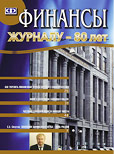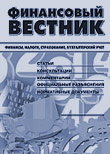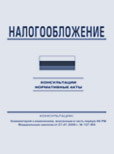Содержание
АКТУАЛЬНО
E-mail: finance-journal@mail.ru
В журнале представлена информация о проходившем в Центральном выставочном зале «Манеж» 18.10.2024 Московском финансовом форуме (МФФ-2024). Участие в МФФ-2024 приняли более 2,5 тыс. делегатов, среди которых были представители как федеральной и региональных властей, так и бизнеса, ведущие эксперты в области экономики и финансов, лидеры общественных организаций и др. Главная тема МФФ-2024 – «Суверенная финансовая система в период трансформации: на службе национальным целям, на страже благосостояния». Как на пленарной сессии, в которой участвовали министр финансов РФ А.Г. Силуанов и мэр Москвы С.С. Собянин, так и на 15 панельных сессиях проходили обсуждения проблем бюджета, финансов, налогообложения, роль цифровизации, анализировались достигнутые результаты и рассматривались пути совершенствования в условиях внешнего давления. Председатель Правительства РФ М.В. Мишустин в видеообращении к участникам МФФ-2024 отметил важность форума как дискуссионной площадки, напомнил, что в последние годы России пришлось искать ответы на беспрецедентные по масштабу вызовы и в этом принимали самое активное участие финансисты. Он подчеркнул, что «благодаря найденным решениям наша страна продолжает двигаться вперед», уточнив, что в настоящее время по объему валового внутреннего продукта, рассчитанному по паритету покупательной способности, Россия уступает лишь Китаю, США и Индии.
Ключевые слова: Московский финансовый форум, бюджет, финансовая система, налогообложение, цифровизация, регионы.
ФИНАНСЫ И БЮДЖЕТ: ПРОБЛЕМЫ И РЕШЕНИЯ
В.В. Левина, профессор Базовой кафедры Благотворительного фонда поддержки образовательных программ «Капитаны», «Инновационный менеджмент и социальное предпринимательство» Российского экономического университета имени Г.В. Плеханова, доктор экономических наук
E-mail: vvl2004@mail.ru
В статье проанализированы бюджеты российских городов – муниципальных образований с численностью населения более миллиона человек. Выявлены типичные особенности, связанные с особой ролью налоговых поступлений как источника бюджетных доходов крупных городов. Обоснована необходимость диверсификации налоговых доходов местных бюджетов. Сформированы рекомендации, адресованные преимущественно федеральным и региональным органам власти по перераспределению части налоговых доходов во взаимодействии с органами местного самоуправления городов-миллионников за счет пересмотра нормативов распределения доходов, что нацелено на развитие экономики и социальной сферы крупных городов и субъектов РФ, центрами которых они являются.
Ключевые слова: местный бюджет, город, доходы бюджета, налоговые доходы, нормативы передачи налоговых доходов.
А.К. Караев, главный научный сотрудник Института исследований социально-экономических трансформаций и финансовой политики Финансового университета при Правительстве Российской Федерации, доктор технических наук, профессор
E-mail: AKKaraev@fa.ru
В.В. Понкратов, директор Института исследований социально-экономических трансформаций и финансовой политики Финансового университета при Правительстве Российской Федерации, кандидат экономических наук
E-mail: VPonkratov@fa.ru
Приоритетной целью макроэкономической политики России является поддержание бюджетной устойчивости и стабильного уровня цен, характеризующегося низким уровнем инфляции. Межбюджетные трансферты (МБТ) общего характера бюджетам бюджетной системы Российской Федерации играют значимую роль в обеспечении роста доходов субъектов Российской Федерации, содействуя сбалансированности как субфедеральных бюджетов, так и всей бюджетной системы. Результаты немногочисленных эмпирических исследований пока не дают однозначного ответа о инфляционных последствиях МБТ бюджетам. Цель исследования – изучение динамической причинно-следственной связи между инфляцией и МБТ бюджетам бюджетной системы Российской Федерации на основе ежемесячных данных за период времени с января 2011 по декабрь 2021 г. с использованием вейвлет-когерентного анализа, который позволяет отделить краткосрочные, среднесрочные и долгосрочные эффекты в причинных связях между переменными. Результаты исследования свидетельствуют о том, что в в долгосрочной перспективе, на масштабах 70–90 мес. сформированы два режима, в которых инфляционные последствия фискальной политики на основе предоставляемых регионам МБТ разные: на временном участке 01/2014–01/2015, сформирован режим, в котором рост МБТ приводит к росту инфляции, поэтому в качестве мер для снижения инфляции можно использовать меры по снижению МБТ; на временном участке 01/2015–06/2020 сформирован режим, в котором рост МБТ подавляет инфляцию; этот режим является наиболее эффективным для разработки фискальной политики и фискальных правил, повышающих фискальную устойчивость и не вызывающих рост инфляции. Основные выводы и рекомендации исследования заключаются в том, что, полученные результаты имеют очевидные политические последствия, так как целевые фискальные межбюджетные трансфертные расходы могут быть мощным перераспределительным фискальным инструментом, который стимулирует экономику, не разгоняя инфляцию цен, а также могут быть использованы в конструировании стабилизационных фискальных правил, стремящихся обеспечить как бюджетную устойчивость, так и снизить волатильность макроэкономических показателей, в первую очередь инфляции.
Ключевые слова: межбюджетные трансферты бюджетам, инфляция, вейвлет-анализ, вейвлет-когерентность, разность фаз вейвлетов.
РЕГИОНАЛЬНЫЕ ФИНАНСЫ
Н.А. Шаповалова, старший научный сотрудник Центра инициативного бюджетирования НИФИ Минфина России
E-mail: shapovalova@nifi.ru
В.А. Паксиваткина, эксперт Центра инициативного бюджетирования НИФИ Минфина России
E-mail: paksivatkina@nifi.ru
В статье представлена методика оценки развития инициативного бюджетирования в субъектах Российской Федерации, ставшая первой на федеральном уровне попыткой комплексной оценки процессов развития инициативного бюджетирования. Подробно описаны этапы реализации оценки – отбор ключевых показателей, сбор количественных данных, проведение экспертного опроса, расчет балльной оценки и интеграция качественных показателей развития инициативного бюджетирования.
Ключевые слова: инициативное бюджетирование, мониторинг развития инициативного бюджетирования, участие граждан в бюджетных решениях.
НАЛОГИ: ТЕОРИЯ И ПРАКТИКА
В.Г. Пансков, профессор-исследователь Финансового университета при Правительстве Российской Федерации, заслуженный экономист Российской Федерации, государственный советник налоговой службы I ранга, лауреат общенациональной премии Российского профессорского собрания «Профессор года – 2022», доктор экономических наук, профессор
E-mail: 5868116@mail.ru
Статья посвящена одной из важнейших проблем российской системы налогообложения – занижению налоговой базы по налогу на доходы физических лиц (НДФЛ) за счет сокрытия населением получаемых доходов. Как показывают расчеты, в экономике ежегодно скрывается от налогообложения порядка 10 трлн руб., вследствие чего бюджетная система страны несет серьезные финансовые потери. При этом самой распространенной формой уклонения от уплаты НДФЛ является выплата части заработной платы наемным работникам в «конверте». Установлены факторы, способствующие данному явлению, а также причины, побуждающие налогоплательщиков и других участников налоговых отношений скрывать реальный размер подлежащих обложению доходов. Предложены направления минимизации действующей практики сокращения налоговой базы и уклонения от уплаты НДФЛ.
Ключевые слова: зарплата в «конверте», контроль доходов и расходов населения, налоговая нагрузка, налоговая ставка, НДФЛ, страховые платежи, теневая экономика, уклонение от налогообложения, финансовые санкции.
Л.Ш. Юлгушева, доцент кафедры государственных и муниципаль-ных финансов РЭУ им. Г.В. Плеханова, руководитель практики по оказанию услуг частным клиентам ФБК Legal, кандидат экономических наук
E-mail: lilia.yulgusheva@gmail.com
В статье анализируются проблемы современного российского налогообложения доходов от операций с иностранной валютой, совершаемых физическими лицами, а также предлагаются способы их решения в целях совершенствования отечественной налоговой системы и повышения собираемости налогов.
Ключевые слова: налогообложение доходов физических лиц; налоговый контроль; операции с иностранной валютой; инвестиционные доходы.
Е.А. Сафохина, доцент кафедры экономики и бухгалтерского учета Московского университета Министерства внутренних дел Российской Федерации имени В.Я. Кикотя, кандидат экономических наук, доцент
E-mail: saf-ea@yandex.ru
Рассмотрены особенности налогового мониторинга как формы налогового контроля, представлена статистика. Отмечено, что данная форма налогового контроля представляет собой инструмент, при помощи которого возможно усовершенствовать государственное управление налоговой системой РФ, повысить уровень конкурентоспособности налоговой политики страны. Налоговый мониторинг при реализации своих целей будет способствовать оптимизации налоговой системы России. Сформулированы предложения, направленные на дальнейшее усовершенствование института мотивированного мнения в рамках налогового мониторинга, а также в части совершенствования риск-ориентированного подхода. Сделан вывод о том, что дальнейшее развитие и распространение налогового мониторинга за счет дальнейшего совершенствования информационных технологий, применяемых в данной форме контроля, позволит снизить риски совершения налоговых правонарушений и преступлений.
Ключевые слова: налоговый контроль, налоговый мониторинг, цифровизация налогового контроля, суммовые критерии, мотивированное мнение, риск-ориентированный подход.
МНЕНИЯ
Т.А. Черкашина, профессор кафедры финансового мониторинга и финансовых рынков Ростовского государственного экономического университета (РИНХ), кандидат экономических наук
E-mail: tkcherkashina@mail.ru
В статье представлен обзор практики регулирования деятельности оценщиков в РФ, а также отражены вызовы, которые необходимо учитывать в профессиональной работе, – введение профессиональных стандартов, квалификационных аттестатов, создание единого евразийского рынка оценочных услуг и др.
Ключевые слова: оценочная деятельность, саморегулируемые организации оценщиков, единый евразийский рынок оценочных услуг.
ФИНАНСЫ СОЦИАЛЬНОЙ СФЕРЫ
А.К. Соловьев, директор Научно-исследовательского центра развития государственной пенсионной системы и актуарно-статистического анализа Финансового университета при Правительстве Российской Федерации, заслуженный экономист Российской Федерации, доктор экономических наук, профессор
E-mail: ASolovyev@fa.ru
Актуализация национальных целей экономического развития России в Указе Президента РФ от 07.05.2024 № 309 конкретизирует приоритетную задачу роста благополучия и достойного уровня жизни всех граждан страны и в первую очередь слабозащищенных категорий, определяя четкие критерии и показатели как на бюджетный период, так и на долгосрочную перспективу. Особенно важное значение это имеет для решения наиболее острой проблемы отечественной пенсионной системы – повышения уровня жизни различных категорий пенсионеров: перехода от борьбы с бедностью пенсионеров к обеспечению достойного уровня жизни и благополучия в течение всего пенсионного периода.
На предстоящий бюджетный и плановый период 2025–2027 гг. предусмотрены конкретные мероприятия, которые обеспечивают достижение указанных национальных целей к установленным срокам. На это, в частности, направлены существенные изменения механизмов индексации страховой пенсии работающих и неработающих пенсионеров, расширяются виды и повышаются размеры пенсионных и социальных выплат целевым категориям застрахованных лиц, развиваются методы стимулирования добровольных форм участия в страховой пенсионной системе. Статья посвящена анализу особенностей российской пенсионной системы на бюджетно-плановый период.
Ключевые слова: цифровые валюты, макроэкономика, финансовая политика, цифровая политика, процентные ставки, распределённый реестр, инфляция, денежная масса.
Content
TOPICAL
E-mail: finance-journal@mail.ru
The magazine provides information about the Manezh Central Exhibition Hall 18.10.2024 the Moscow Financial Forum (MFF-2024). More than 2.5 thousand delegates took part in the MFF-2024, including representatives of both federal and regional authorities and business, leading experts in the field of economics and finance, leaders of public organizations, etc. The main theme of the MFF-2024 is «The sovereign financial system in the period of transformation: in the service of national goals, on guard of welfare».Both at the plenary session, in which the Minister of Finance of the Russian Federation A.G. Siluanov and Moscow Mayor S.S. Sobyanin, and at 15 panel sessions, discussions were held on the problems of budget, finance, taxation, the role of digitalization, the results achieved were analyzed and ways to improve in conditions of external pressure were considered. Prime Minister M.V. Mishustin in a video message to the MFF-2024 participants noted the importance of the forum as a discussion platform, recalled that in recent years Russia had to look for answers to unprecedented challenges and financiers took an active part in this.He stressed that «thanks to the solutions found, our country continues to move forward», specifying that at present, in terms of gross domestic product, calculated at purchasing power parity, Russia is second only to China, the United States and India.
Keywords: Moscow financial forum, budget, financial system, taxation, digitalization, regions.
FINANCE AND BUDGET: PROBLEMS AND SOLUTIONS
V.V. Levina, Professor, Basic Department of the Captains Charitable Foundation for the Support of Educational Programs, Innovative Management and Social Entrepreneurship, G.V. Plekhanov Russian University of Economics, Doctor of Economics
E-mail: vvl2004@mail.ru
The article analyzes the budgets of Russian cities - municipalities with a population of more than a million people. Typical features associated with the special role of tax revenues as a source of budget revenues of large cities have been identified. The need to diversify tax revenues of local budgets is justified. Recommendations have been formed, addressed mainly to federal and regional authorities on the redistribution of part of tax revenues in cooperation with local governments of cities with a population of over one million by revising the standards for the distribution of income, which is aimed at developing the economy and social sphere of large cities and constituent entities of the Russian Federation, the centers of which they are.
Keywords: local budget, city, budget revenues, tax revenues, tax revenue transfer standards.
A.K. Karaev, Chief Researcher of the Institute for the Study of Socio-Economic Transformation and Financial Policy, Financial University under the Government of the Russian Federation, Doctor of Technical Sciences, Professor
E-mail: AKKaraev@fa.ru
V.V. Ponkratov, Director of the Institute for the Study of Socio-Economic Transformation and Financial Policy University under the Government of the Russian Federation,Candidate of Economic Sciences
E-mail: VPonkratov@fa.ru
The priority goal of Russia's macroeconomic policy is to maintain budget sustainability and a stable price level characterized by low inflation. General interbudgetary transfers (IGT) to the budgets of the budget system of the Russian Federation play a significant role in ensuring the growth of revenues of the constituent entities of the Russian Federation, contributing to the balance of both subfederal budgets and the entire budget system. The results of the few empirical studies do not yet provide an unambiguous answer about the inflationary consequences of interbudgetary transfers to budgets. The objective of the study is to examine the dynamic causal relationship between inflation and interbudgetary transfers to the budgets of the budget system of the Russian Federation, based on monthly data for the period from January 2011 to December 2021, using wavelet coherence analysis, which allows separating short-term, medium-term and long-term effects in causal relationships between variables. The results of the study indicate that in the long term, on the scale of 70–90 months, two regimes have been formed in which the inflationary consequences of fiscal policy, based on the IBT provided to the regions, are different: in the time period 01/2014–01/2015, a regime has been formed in which the growth of IBT leads to an increase in inflation, therefore, measures to reduce IBT can be used as measures to reduce inflation; in the time period 01/2015–06/2020, a regime has been formed in which the growth of the IBT suppresses inflation, this regime is the most effective for developing fiscal policy and fiscal rules that increase fiscal sustainability and do not cause inflation growth. The main conclusions and recommendations of the study are that the results obtained have obvious political implications, since targeted fiscal interbudgetary transfer expenditures can be a powerful redistributive fiscal instrument that stimulates the economy without accelerating price inflation, and can also be used in the construction of stabilization fiscal rules that seek to ensure both budget sustainability and reduce the volatility of macroeconomic indicators, primarily inflation.
Keywords: interbudgetary transfers to budgets, inflation, wavelet analysis, wavelet coherence, wavelet phase difference.
REGIONAL FINANCE
N.A. Shapovalova, Senior Researcher, Center for Initiative Budgeting of the NIFI of the Ministry of Finance of Russia
E-mail: shapovalova@nifi.ru
V.A. Paksivatkina, expert of the Center for Initiative Budgeting of the NIFI of the Ministry of Finance of Russia
E-mail: paksivatkina@nifi.ru
The article presents a methodology for assessing the development of initiative budgeting in the regions of the Russian Federation, which became the first attempt at a comprehensive assessment of the development processes of initiative budgeting at the federal level. The stages of the assessment implementation are described in detail - selection of key indicators, collection of quantitative data, conducting an expert survey, calculation of a score and integration of qualitative indicators of the development of initiative budgeting.
Keywords: initiative budgeting, monitoring of the development of initiative budgeting, citizen participation in budget decisions.
TAXES: THEORY AND PRACTICE
V.G. Panskov, Research Professor at the Financial University under the Government of the Russian Federation, Honored Economist of the Russian Federation, State Adviser to the Tax Service of the 1st rank, Laureate of the National Prize of the Russian Professorial Assembly «Professor of the Year - 2022», Doctor of Economic Sciences, Professor
E-mail: 5868116@mail.ru
The article is devoted to one of the most important problems of the Russian taxation system - the underestimation of the tax base for personal income tax (PIT) due to the concealment by the population of the income received. As calculations show, about 10 trillion rubles are hidden from taxation annually in the economy, as a result of which the country's budget system suffers serious financial losses. At the same time, the most common form of personal income tax evasion is the payment of part of the wages to employees in an «envelope». Factors contributing to this phenomenon have been established, as well as the reasons prompting taxpayers and other participants in tax relations to hide the real amount of income subject to taxation. Proposed directions to minimize the current practice of reducing the tax base and evading personal income tax.
Keywords: salary in the «envelope», control of income and expenses of the population, tax burden, tax rate, personal income tax, insurance payments, shadow economy, tax evasion, financial sanctions.
L.Sh. Yulgusheva, Associate Professor of the Department of State and Municipal Finance of the PRUE named after G.V. Plekhanov, Head of Practice for the Provision of Services to Private Clients of FBK Legal, Candidate of Economic Sciences
E-mail: lilia.yulgusheva@gmail.com
The article analyzes the problems of modern Russian taxation of income from foreign currency transactions performed by individuals, and also proposes ways to solve them in order to improve the domestic tax system and increase tax collection.
Keywords: taxation of personal income; tax control; foreign currency transactions; investment income.
E.A. Safokhina, Associate Professor, Department of Economics and Accounting, Moscow University, Ministry of Internal Affairs of the Russian Federation named after V.Ya. Kikotya, Candidate of Economic Sciences, Associate Professor
E-mail: saf-ea@yandex.ru
Features of tax monitoring as a form of tax control are considered, statistics are presented. It was noted that this form of tax control is a tool with which it is possible to improve public administration of the tax system of the Russian Federation, to increase the level of competitiveness of the country's tax policy. Tax monitoring in the implementation of its goals will contribute to the optimization of the tax system of Russia. Proposals have been formulated aimed at further improving the institution of motivated opinion within the framework of tax monitoring, as well as in terms of improving the risk-based approach.It was concluded that the further development and dissemination of tax monitoring by further improving the information technologies used in this form of control will reduce the risks of tax offenses and crimes.
Keywords: tax control, tax monitoring, digitalization of tax control, amount criteria, motivated opinion, risk-based approach.
OPINIONS
T.A. Cherkashina, Professor, Department of Financial Monitoring and Financial Markets, Rostov State Economic University (RINH), Candidate of Economic Sciences
E-mail: tkcherkashina@mail.ru
The article provides an overview of the practice of regulating the activities of appraisers in the Russian Federation, and also reflects the challenges that need to be taken into account in professional work - the introduction of professional standards, qualification certificates, the creation of a single Eurasian market for appraisal services, etc.
Keywords: appraisal activities, self-regulatory organizations of appraisers, unified Eurasian market of appraisal services.
SOCIAL FINANCE
A.K. Soloviev, Director of the Research Center for the Development of the State Pension System and Actuarial and Statistical Analysis of the Financial University under the Government of the Russian Federation, Honored Economist of the Russian Federation, Doctor of Economics, Professor
E-mail: ASolovyev@fa.ru
The actualization of the national goals of the economic development of Russia in the Decree of the President of the Russian Federation of 07.05.2024 No. 309 specifies the priority task of increasing the well-being and decent standard of living of all citizens of the country, primarily weakly protected categories, defining clear criteria and indicators both for the budget period and for the long term.This is especially important for solving the most acute problem of the domestic pension system - improving the standard of living of various categories of pensioners: the transition from the fight against poverty of pensioners to ensuring a decent standard of living and well-being throughout the entire pension period.
For the upcoming budget and planning period 2025-2027. specific measures are envisaged that ensure the achievement of these national goals by the deadlines. This, in particular, is aimed at significant changes in the mechanisms for indexing the insurance pension of working and non-working pensioners, expanding the types and increasing the size of pension and social payments to the target categories of insured persons, developing methods to stimulate voluntary forms of participation in the insurance pension system.The article is devoted to the analysis of the features of the Russian pension system for the budget-planning period.
Keywords: state pension system, compulsory pension insurance, national goals, working pensioners, indexation of pensions.













